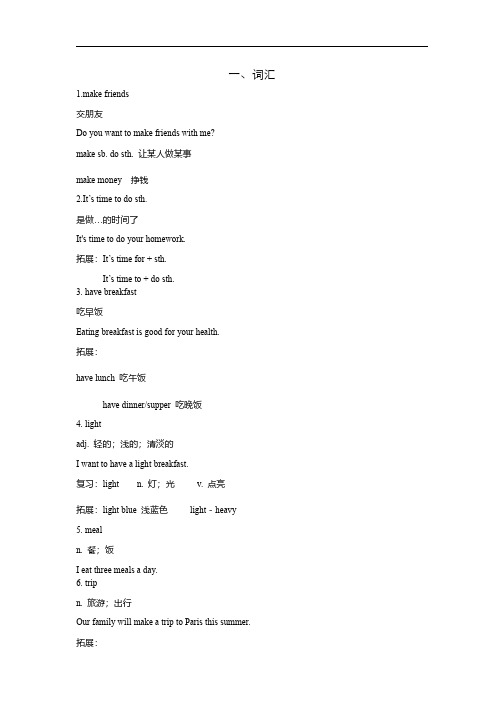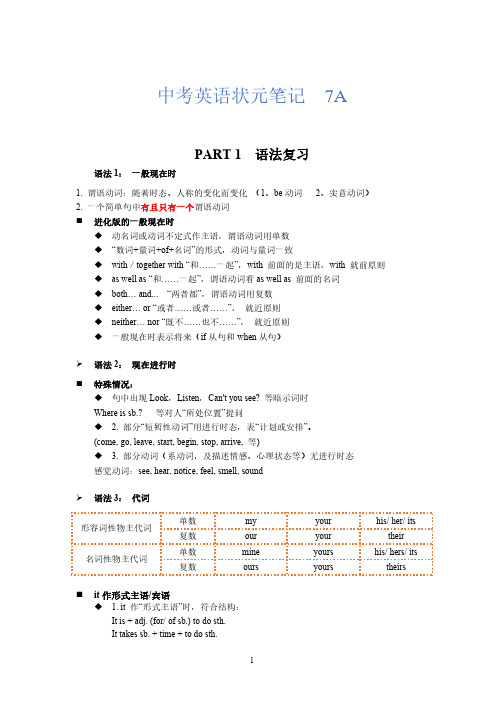2020中考状元笔记英语-精选.pdf
中考状元学霸笔记1

一、单词(1)both[bəʊθ]adj.两者的pron.两者都both A and B+are…A和B都…(2)large[lɑ:dʒ]adj.大的(3)habit[ˈhæbɪt]n.习惯(4)remember[rɪˈmembə(r)]v.记得remember to do记得去做某事remember doing记得做过某事(5)place[pleɪs]n.地方;v.放置【深度拓展】常见的名词作动词:1.head n.头;v.前往2.hand n.手;v.递、给hand in上交hand out分发3.face n.脸;v.面对4.should n.肩膀v.肩负5.voice n.嗓音v.表达(6)noisy[ˈnɔɪzi]adj.吵闹的1.noise n.噪音make a noise制造噪音2.noise n.噪音voice n.嗓音sound n.声音(7)begin[bɪˈɡɪn]v.开始beginning n.开始at the beginning在一开始(8)forget[fə(r)ˈɡet]v.忘记1.forget to do sth.忘记去做某事(没做)forget doing sth.忘记做过某事(做了)2.反义词:remember v.记得remember to do sth.记得去做某事(还没做)remember doing sth.记得做过某事(做了)【深度拓展】1.unforgettable adj.难以忘记的(9)important[ɪmˈpɔː(r)t(ə)nt]adj.重要的【常规拓展】初一上学期必备句型:It’s important for sb.to do sth.:对于某人来说做某事很重要。
对于我们来说早睡很重要。
It’s important for us to go to bed early.【常规拓展】It’s important for sb.to develop a good habit of doing sth.1.对于我们来说,养成吃健康食物的习惯很重要。
九年级英语状元笔记

九年级英语状元笔记Here is a 700-word English essay on the topic of "A Top Ninth Grade English Student's Notes":A Top Ninth Grade English Student's Notes。
As a top ninth grade English student, I have developed a comprehensive set of study notes that have helped me excel in the subject. These notes cover a wide range of topics, from grammar and vocabulary to literature analysis and writing skills. In this essay, I will share some of the key insights and strategies I have learned over the years.One of the fundamental aspects of English that I have focused on is grammar. Having a strong grasp of grammar is essential for effective communication, both in writing and speaking. In my notes, I have meticulously documented the rules and structures of the English language, from parts of speech to sentence construction. I have also included numerous examples to illustrate these concepts, making it easier for me to apply them in my own writing.In addition to grammar, I have also dedicated a significant portion of my notes to vocabulary development. English is a rich and diverse language, with a vast array of words at our disposal. However, simply memorizing words is not enough – I have learned to understand the nuances and connotations of different terms, as well as how to use them in context. My vocabulary notes include not only definitions, but also synonyms, antonyms, and examples of how the words can be used in sentences.Another crucial aspect of my English studies has been literature analysis. Whetherit's reading a classic novel or dissecting a poem, I have developed a systematic approach to understanding and interpreting literary works. My notes include detailed summaries of plot, character development, themes, and literary devices. I have also practiced close reading and annotation techniques to help me engage more deeply with the text.Writing skills are another area that I have focused on extensively in my English studies. Effective writing requires a combination of technical proficiency and creative expression. In my notes, I have outlined various writing strategies, such as brainstorming, outlining, and revising. I have also explored different genres of writing, from persuasive essays to creative narratives, and have practiced applying the appropriate style and tone for each.One of the most valuable aspects of my English notes, however, is the emphasis on critical thinking and problem-solving. In today's world, the ability to analyze information, form logical arguments, and think creatively is essential. Throughout my studies, I have learned to approach English not just as a set of rules and facts, but as a tool for exploring ideas, challenging assumptions, and developing a deeper understanding of the world around me.To illustrate this, let me share an example from my notes. In a unit on literary analysis, I explored the theme of identity in a classic novel. Rather than simply summarizing the plot and identifying the key characters, I delved deeper into the nuances of the protagonist's journey, examining how their sense of self was shaped by their experiences, relationships, and societal expectations. I then drew connections to real-world issues of identity, diversity, and social justice, demonstrating how literature can serve as a lens for understanding the human condition.Overall, my English notes have been an invaluable resource for my academic success. By focusing on a comprehensive range of skills, from grammar and vocabulary to literature analysis and critical thinking, I have been able to develop a well-rounded and adaptable approach to the subject. As I continue my educational journey, I am confident that these notes will continue to serve me well, helping me to excel not only in English, but in all areas of my studies.。
中考状元学霸笔记3

一、词汇1.make friends交朋友Do you want to make friends with me?make sb.do sth.让某人做某事make money挣钱2.It’s time to do sth.是做…的时间了It's time to do your homework.拓展:It’s time for+sth.It’s time to+do sth.3.have breakfast吃早饭Eating breakfast is good for your health.拓展:have lunch吃午饭have dinner/supper吃晚饭4.lightadj.轻的;浅的;清淡的I want to have a light breakfast.复习:light n.灯;光v.点亮拓展:light blue浅蓝色light-heavy5.mealn.餐;饭I eat three meals a day.6.tripn.旅游;出行Our family will make a trip to Paris this summer.拓展:make a trip to…去…旅行travel to…去…旅行7.differentadj.不同的I have different pencils.拓展:difference不同点be different from…与…不同the same as与…相同8.earthn.地球;泥土;陆地The earth is our home.拓展:on the earth在地球上on earth究竟9.difficultadj.困难的This question is difficult.拓展:difficulty n.困难easy简单的hard困难的10.keepv.保持;保存;坚持It’s important to keep healthy.拓展:keep the book保存书keep a pet养宠物keep running坚持跑步11.旅游;出行落实②different不同的地球;泥土;陆地earthdifficult困难的keep保持;保存;坚持11.simplyadv.简单地;仅仅She is simply a little girl.拓展:simple adj.简单的12.cornern.拐角;角落It is standing in the corner. 13.freeadj.免费的;自由的;空闲的I am free like a bird now.buy one get one free买一送一拓展:freedom n.自由14.be popular with受…的欢迎Jay Chou is popular with Chinese.15.solvesolve the problemv.解决;解答I want to solve all your problems.简单地;仅仅落实③corner角落免费的;自由的;空闲的freebe popular with受…的欢迎solve解决16.realizev.意识到;实现My mother realized her mistake.拓展:realize my dream实现我的梦想17.reviewv.复习n.复习;评论It’s time to review my lessons.17.review【re-前缀再一次】rewrite重写respell重拼recycle循环return返回18.pointv.指,点n.得分;要点You didn't get my point.拓展:point out指出19.mentionv./n.提到;说起Don't mention it.谐音:门神—过春节时我们会“提及“各种神仙,20.discussv.商量;讨论Let's discuss it.拓展:discuss=talk aboutdiscussion n.讨论20.discussdiscussion n.讨论二、语法连词板块的重点在于常考连词的意思和连词前后的逻辑关系1.and和;并且。
中考英语状元笔记及知识点集 (1)

【知识梳理】I.重点短语1.Sit down2.on duty3.in English4.have a seat5.at home6.look like7.look atII.重要句型1.help sb. do sth.2.What about…?3.Let’s do sth.4.It’s time to do sth.5.It’s time for…8.have a looke on10.at work11.at school12.put on13.look after14.get up15.go shopping【知识梳理】I.重点短语1.a bottle of2.a little3.a lot (of)4.all day5.be from6.be overe backe from9.get down10.go shopping11.have a drink of12.would like13.get home14.get to15.get up16.have lunch17.have supper18.listen to19.not…at all20.put…away21.take off22.on a farm23.in a factory24.have a look25.have breakfast26.6.What’s…? It is…/It’s…7.Where is…?It’s….8.How old are you? I’m….9.What class are you in? I’m in….10.Welcome to….11.What’s …plus…?It’s….12.I think…13.Who’s this? This is….14.What can you see?I can see….15.There is (are) ….16.What colour is it (are they)? It’s (They’re)…17.Whose …is this?It’s….18.What time is it? It’s….III.交际用语1.Good morning, Miss/Mr….2.Hello! Hi!3.Nice to meet you. Nice to meet you, too.4.How are you? I’m fine, thank you/thanks. And you?5.See you. See you later.6.Thank you! You’re welcome.7.Goodbye! Bye!8.What’s your name? My name is….9.Here you are. This way, please.10.Who’s on duty today?11.Let’s do.12.Let me see.IV.重要语法1.动词be 的用法;2.人称代词和物主代词的用法;3.名词的单复数和所有格的用法;4.冠词的基本用法;5.There be 句型的用法。
中考复习:中考英语状元笔记-重点语法词法梳理

中考英语状元笔记7APART1语法复习语法1:一般现在时1.谓语动词:随着时态、人称的变化而变化(1、be动词2、实意动词)2.一个简单句中有且只有一个谓语动词⏹进化版的一般现在时◆动名词或动词不定式作主语,谓语动词用单数◆“数词+量词+of+名词”的形式,动词与量词一致◆with/together with“和……一起”,with前面的是主语,with就前原则◆as well as“和……一起”,谓语动词看as well as前面的名词◆both…and...“两者都”,谓语动词用复数◆either…or“或者……或者……”,就近原则◆neither…nor“既不……也不……”,就近原则◆一般现在时表示将来(if从句和when从句)语法2:现在进行时⏹特殊情况:◆句中出现Look,Listen,Can't you see?等暗示词时Where is sb.?等对人“所处位置”提问◆ 2.部分“短暂性动词”用进行时态,表“计划或安排”。
(come,go,leave,start,begin,stop,arrive,等)◆ 3.部分动词(系动词,及描述情感、心理状态等)无进行时态感觉动词:see,hear,notice,feel,smell,sound语法3:代词形容词性物主代词单数my your his/her/its 复数our your their名词性物主代词单数mine yours his/hers/its 复数ours yours theirs⏹it作形式主语/宾语◆ 1.it作“形式主语”时,符合结构:It is+adj.(for/of sb.)to do sth.It takes sb.+time+to do sth.◆ 2.it作“形式宾语”时,符合结构:sb.find it+adj.to do sth.语法4:特殊疑问词1.疑问代词:l指人:who, whoml指物:whatl既可指人又可指物:which, whose2.疑问副词:when, where, how, why3.特殊疑问词作主语,不确定数量时,谓语动词用单数How about=What about...怎么样...?How often多久一次(询问频率)回答:four times a year;always...How soon还有多久(短期)回答:in+一段时间How many/much多少(可数名词/不可数名词)How long多长时间回答:(for)+一段时间How far距离多远回答:ten miles/3kilometers(具体的距离)ten minutes’walk/five minutes’by bus语法5:名词⏹可数名词---复合名词复数变化两个名词构成:boy friends;paper bags(前不变后变)◆man或woman修饰:women doctors,men waiters(涉及到man/woman来修饰名词,需要两个名词同时变复数)⏹2、名词---修饰词◆只修饰单数名词---冠词:an/a;the◆只修饰复数名词—修饰词:few,a few/many,several/a great number of◆只修饰不可数名词:little,a little,much,a great amount of注:可同时修饰可数名词&不可数名词:some,any,a lot of=lots of,more,most,enough,plenty ofPART2词法复习1.形容词&副词✓ 1.系表结构(be+adj.\感官动词+adj.)感官动词:look,hear,smell,taste,feel✓ 2.频率副词:always,often,sometimes,seldom,hardly,never 2.[辨析]wear,put on,in,dress和have on✓wear意为“穿,戴”,强调状态。
